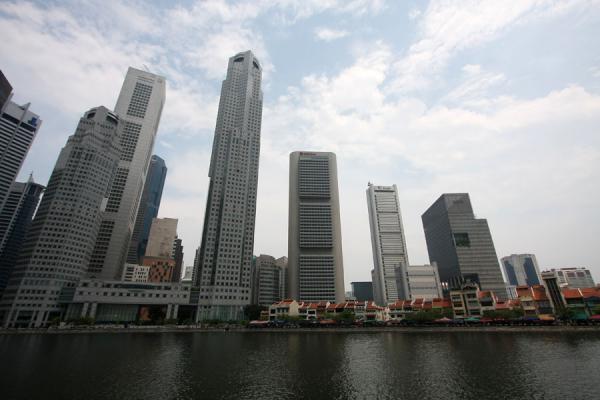Review: Singapore, A Biography
 Mark Frost and Yu-Mei Balasingamchow. Singapore: A Biography. Singapore: National Museum of Singapore, 2009.
Mark Frost and Yu-Mei Balasingamchow. Singapore: A Biography. Singapore: National Museum of Singapore, 2009.Ten years ago, the memoirs of Lee Kuan Yew, Singapore’s first Prime Minister, were published in two volumes entitled The Singapore Story and From Third World to First. Much has been made of the audacious ‘The’ of the first volume — not a but the only Singapore Story, synonymous with Lee’s own. Yet it would be little exaggeration to say that Singapore, for the past fifty years at least, has really had no other.
But now, Singapore has a new story.
At one level, Singapore: A Biography is reminiscent of those exciting, colourful city histories of Paris, London or Istanbul. In rich, clear prose, authors Mark Frost and Yu-Mei Balasingamchow introduce us to a Singapore populated with an eclectic cast of merchants, pirates, silversmiths, secret societies, opium-soaked labourers, defiant Sultans, renegade colonial officials, soldiers, sailors, scribes, and irrepressibly modern Chinese girls. They show us a city of many faces: Singapore, the bustling colonial entrepôt and progenitor of today’s self-consciously modern port city; the cosmopolis with seedy undersides; the tiny island under Japanese siege.
However, it is a biography of Singapore, not an autobiography. And as such, at a deeper level -- the level of national memory -- this biography is a bid to reclaim a little of the ground on which Singapore’s history has stood for so long. It seeks to move away from the obsessions of posterity that haunt any autobiographical account of the past, and towards more honest national self-assessment. Written as a popular history, the text is solidly researched, lucid and lavish with illustrations. It is unfailingly accessible. And it's this accessibility which makes it a dangerous sort of Trojan horse, one that's trundling quiet dissent into the citadel of doctrinal Singaporean history.
One of its many challenges to canonical historiography is its unusually long view. While few histories of Singapore venture much beyond 1965 (the year of Singapore’s official independence), this book takes 1965 as its end-point: it begins instead in the fourteenth century, when Singapore was little more than a rock with an uncertain name.  At these far extremes of the island’s recorded history, readers encounter fragmentary but competing stories of the past, which, they are told, vary according to which source you listen to. Was the last king of Singapore Parameswara the Hindu opportunistic usurper, or Sultan Iskandar Shah, the Muslim and great builder of empire? It depends on whether you listen to the Portuguese or the Malays. Were the infamous ‘pirates’ of the Straits really just lawless plunderers? Or were they dispossessed chiefs legitimately resisting what they perceived as the illegitimate expansion of European empire? It depends on whether you listen to the colonizer or the colonized. Recent history, it is implied, should be treated similarly. Did Lee Kuan Yew and his People’s Action Party (PAP) represent the best interests of the mass base of unionized Singaporean workers of the 1960s? Or did they, in the end, betray them? It depends on who you listen to.
At these far extremes of the island’s recorded history, readers encounter fragmentary but competing stories of the past, which, they are told, vary according to which source you listen to. Was the last king of Singapore Parameswara the Hindu opportunistic usurper, or Sultan Iskandar Shah, the Muslim and great builder of empire? It depends on whether you listen to the Portuguese or the Malays. Were the infamous ‘pirates’ of the Straits really just lawless plunderers? Or were they dispossessed chiefs legitimately resisting what they perceived as the illegitimate expansion of European empire? It depends on whether you listen to the colonizer or the colonized. Recent history, it is implied, should be treated similarly. Did Lee Kuan Yew and his People’s Action Party (PAP) represent the best interests of the mass base of unionized Singaporean workers of the 1960s? Or did they, in the end, betray them? It depends on who you listen to.
Unionized Singapore in the 1960s [image credit]
And the book is saying: listen to others. It is a gentle but powerful suggestion in a state set up along parental lines, whose citizens are encouraged to remember themselves as trustful beneficiaries of the state’s good judgment. This is why, for a PAP-led Singapore, pre-PAP history must not matter. As Frost and Balasingamchow point out, independence ‘set Singapore’s historical clock back to zero’. The party rose to power with the slightly chilling slogan ‘We have no history!’, and it has remained solidly in power ever since. On this remarkable blank slate, it enacted the social and urban revolutions for which it is rightly exalted: accelerated development, mass housing initiatives, unrivalled transport infrastructure, a healthcare system Americans can only dream of. 
Singapore skyline [image credit]
Yet all this has come at the cost of a creeping dispossession. Somewhere amidst the triumphs of modernization and nation-building, Singaporeans have lost their own sense of history. After fifty years of disconcertingly efficient autocracy, Singapore today is populated less by eclectic personalities than by a single people systematically discouraged from probing under the skin of the bestowed national self. A new Singapore story has been long overdue, and one has come now, appropriately, as an anniversary present for the fiftieth year of continuous PAP rule in Singapore.
Singapore: A Biography will be a truly absorbing read for anyone. If you know absolutely nothing about Singapore's history, this is probably the only 'Singapore story' you should read. But for Singaporeans themselves, this book presents a subtle yet epochal challenge: to begin a search for another storyteller, and perhaps in the process, for a little bit of their own selves.
Singapore: A Biography is available in Singapore, and is due to be released in the UK in March. It comes with a blog on which the authors provide an ongoing commentary on the past, present and future of the book.